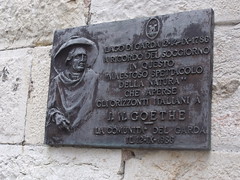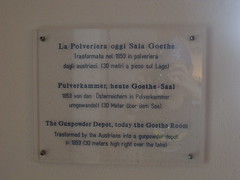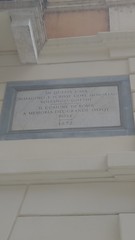Johann Wolfgang von Goethe
.jpg?width=250)
.jpg?width=250)
Johann Wolfgang von Goethe
(1749-1832)
Commemorated on 3 plaques
Lago di Garda 12.14-IX-1786 A ricordo del soggiorno in questo "Maestro spettacolo della natura" Che aperse gli orizzonti Italiani a J. W. Goethe
English translation: Lake Garda 12-14-IX-1786 A souvenir of your stay in this "master spectacle of nature" that opened the Italian horizons to J. W. Goethe
Castello Scaligero, Malcesine, Italy where they visited (1786)
La Polveriera oggi Sala Goethe Transformata nel 1853 in polveriera dagli austriaci. (30 metri a picco sul Lago)
English translation:
Goethe Room - Castello Scaligero, Malcesine, Italy where they is commemorated
In questa casa immagino e scrisse cose immortali Volfango Goethe 1872
English translation: In this house Wolfang von Goethe imagined and wrote immortal things 1872
, Rome, Italy where they stayed (1872)



